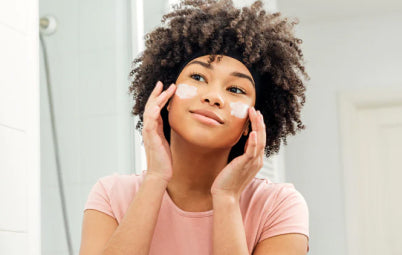There are lots of weird and wonderful ingredients in skincare providing a range of benefits, and if you’ve been wondering what vitamin C is doing in there (yes, the one found in orange juice that boosts your immunity!) you’re in the right place.
We’re putting this multi-purpose skincare ingredient under the microscope to find out what it does, why it’s useful, who it could benefit, and how to get more of it into your skincare routine.
Face Dr’s Skin Experts regularly recommend several products containing vitamin C from the Obagi Medical and ZO Skin Health ranges, so let’s break down all things ascorbic acid (an alternative name for vitamin C!) and find out which products could help with your skin needs.
Want to skip straight to your free consultation with a Skin Expert? Click here:
Here’s what we’ll cover:
- What is vitamin C?
- What does vitamin C do for your skin?
- Who is vitamin C best for?
- Are there any vitamin C side effects to be aware of?
- What should you not use vitamin C alongside?
- What products contain vitamin C?
- Summary: Is vitamin C for you?
What is vitamin C?

Vitamin C is sometimes called ascorbic acid and has a few key functions to keep the body healthy, such as protecting cells, helping to heal wounds, and promoting healthy bones, cartilage and blood vessels.
When it comes to our skin, vitamin C is also a must-have, but we can’t get enough of it in our diet to see any changes in our skin. Instead, adding a product containing vitamin C to your skincare routine could offer many benefits.
What does vitamin C do for your skin?

As vitamin C is a naturally occurring antioxidant, it’s a wonder ingredient for skin with many brilliant benefits. Here are just a few:
- It offers protection against daily environmental stressors like UV exposure and pollution, which lead to oxidative stress and free radical damage
- It has anti-inflammatory properties known to improve skin texture and tone
- It deeply hydrates skin
- Due to its protection against free radicals, it can help minimise the signs of ageing and future-proof skin
- It’s known as a great brightening product, offering a more radiant complexion and a noticeable skin glow
- It can reduce hyperpigmentation and dark spots
- It promotes collagen production, which helps create a youthful complexion
If you want to read more about the many benefits of using vitamin C in your skincare, take a look at our article, Top 5 skincare benefits of Vitamin C
Who is vitamin C best for?

Vitamin C is incredibly popular in skincare because it is safe for most skin types, meaning even those with sensitive skin can benefit from using it. If you are looking for a great ‘everything ingredient’ with multiple benefits, vitamin C could be your new favourite.
In particular, those with dull or lacklustre skin will love the brightness it provides, and those with a desire to minimise fine lines and wrinkles could benefit from adding a topical vitamin C to their routine. And of course, those with any of the above skincare issues could see a difference with vitamin C.
Are there any vitamin C side effects to be aware of?
Vitamin C is generally thought to be a good product for sensitive skin and has an excellent safety profile, but as with any ingredient, it can still cause allergic reactions for a very small number of people, as well as mild to moderate irritation for others.
One 2017 review found vitamin C may cause minor skin irritation when a product contains a concentration above 20%. For this reason, a patch test is often recommended before you start using a new product to ensure you won’t suffer from side effects like itching, redness or a tingling sensation on the skin when applying.
Adverse reactions are rare, but if you think you may be allergic or sensitive to vitamin C, don’t be afraid to speak to your Skin Expert when discussing products and your skin goals.
What should you not use vitamin C alongside?

Vitamin C is a handy ingredient because you can generally apply it to skin alongside many other ingredients without fear of interference. However, vitamin C works at a specific pH level, so there are a couple of ingredients we advise not using with vitamin C.
Vitamin C and an ingredient called niacinamide (which helps minimise oil production and ease inflammatory acne) tend to cancel each other out. For this reason, it’s recommended that when applying either one first, you should allow time for it to fully absorb into the skin to get the full benefit. Another option which your Skin Expert might recommend is to apply one in the morning and another in the evening.
Vitamin C and retinol are thought to be somewhat of a “power couple” — a great combo for game-changing results! — but as above, it’s advised you apply these in two separate applications so they don’t cancel each other out, as Dr Julia describes over on our YouTube channel.
If you’re curious about what other ingredients don’t mix well in the same application, you can read our article: 6 skincare ingredients that work well together and 6 that don't
What products contain vitamin C?

There are lots of products containing vitamin C, with many high street versions available. However, at Face Dr we’ve tried and tested many science-backed brands over the years and we only recommend the very best ones to our clients, with proven results.
When booking a free video consultation with one of our Skin Experts, you can chat about your skin goals and get product recommendations that we believe will provide the most benefits. One brand our Skin Experts regularly recommend is Obagi Medical, which has a wide range of products and collections containing vitamin C. Here are a few:
Serums are often the best way to add vitamin C to your skincare routine, and the above 3 versions of the Obagi Professional-C ® Serum offer different strengths of vitamin C which will be recommended by your Skin Expert depending on your skin history, issues and goals.
If you’re interested in learning more about Obagi’s Professional-C® Collection, read our article here: What is Obagi’s Professional-C® Collection and how does it work?
If brightness is what you’re looking for, this polish and mask combo could work well for you. You’ll learn more about this product in our article: What is Obagi's Professional-C® Microdermabrasion Polish + Mask, and how does it work?
Our Skin Experts can also recommend a brand called ZO Skin Health, and specifically a product called ZO 10% Vitamin C Self-Activating, which provides a potent dose of vitamin C to brighten and redefine skin.
As an authorised Obagi Medical and ZO Skin Health stockist, Face Dr Skin Experts can discuss any of the above products and find the one that works best for your skin.
Summary: Is vitamin C for you?

It’s the big question. Is vitamin C the miracle-worker ingredient that’s going to completely change your skin? By using the correct product, it certainly could.
If you are looking for a product to protect against daily environmental stressors, improve skin texture and tone, minimise the signs of ageing, and brighten your complexion in a big way, vitamin C could provide exactly what you need.
Your Face Dr Skin Expert can help you discover the best products for your skin, so chat to them in a free video consultation.
Ready to find out if vitamin C is ‘the one’?










